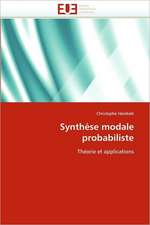An Introduction to Latent Variable Growth Curve Modeling: Concepts, Issues, and Application, Second Edition: Quantitative Methodology Series
Autor Terry E. Duncan, Susan C. Duncan, Lisa A. Stryckeren Limba Engleză Paperback – 23 mai 2006
Updated throughout, the second edition features three new chapters—growth modeling with ordered categorical variables, growth mixture modeling, and pooled interrupted time series LGM approaches. Following a new organization, the book now covers the development of the LGM, followed by chapters on multiple-group issues (analyzing growth in multiple populations, accelerated designs, and multi-level longitudinal approaches), and then special topics such as missing data models, LGM power and Monte Carlo estimation, and latent growth interaction models. The model specifications previously included in the appendices are now available on the CD so the reader can more easily adapt the models to their own research.
This practical guide is ideal for a wide range of social and behavioral researchers interested in the measurement of change over time, including social, developmental, organizational, educational, consumer, personality and clinical psychologists, sociologists, and quantitative methodologists, as well as for a text on latent variable growth curve modeling or as a supplement for a course on multivariate statistics. A prerequisite of graduate level statistics is recommended.
Preț: 350.54 lei
Preț vechi: 401.50 lei
-13% Nou
Puncte Express: 526
Preț estimativ în valută:
67.07€ • 70.03$ • 55.51£
67.07€ • 70.03$ • 55.51£
Carte tipărită la comandă
Livrare economică 04-18 aprilie
Preluare comenzi: 021 569.72.76
Specificații
ISBN-13: 9780805855470
ISBN-10: 0805855475
Pagini: 280
Ilustrații: Illustrations
Dimensiuni: 152 x 229 x 15 mm
Greutate: 0.42 kg
Ediția:Revizuită
Editura: Taylor & Francis
Colecția Routledge
Seria Quantitative Methodology Series
Locul publicării:Oxford, United Kingdom
ISBN-10: 0805855475
Pagini: 280
Ilustrații: Illustrations
Dimensiuni: 152 x 229 x 15 mm
Greutate: 0.42 kg
Ediția:Revizuită
Editura: Taylor & Francis
Colecția Routledge
Seria Quantitative Methodology Series
Locul publicării:Oxford, United Kingdom
Public țintă
ProfessionalCuprins
Contents: Preface. Introduction. Specification of the LGM. LGM, Repeated Measures ANOVA, and the Mixed Linear Model. Multivariate Representations of Growth and Development. Analyzing Growth in Multiple Populations. Accelerated Designs. Multilevel Longitudinal Approaches. Growth Mixture Modeling. Piecewise and Pooled Interruped Time Series LGMs. Latent Growth Curve Modeling With Categorical Variables. Missing Data Models. Latent Variable Framework for LGM Power Estimation. Testing Interaction Effects in LGMs. Summary.
Notă biografică
Terry E. Duncan, Susan C. Duncan and Lisa A. Strycker
Recenzii
"…The book is an excellent mid-level text on latent growth modeling… [The graphics] are arguably better than those in any other book on any aspect of SEM. They are crisp and clear, and the inclusion of the theoretical weights is greatly helpful in understanding the graphics…" - Lee Sechrest, Ph.D., University of Arizona
"I initially learned growth modeling from this book, and I am still a big fan. It allowed me to jump in and get my feet wet with this flexible analytic method…the text really is just as its title suggestsan introduction–and an excellent one at that...." - James A. Bovaird, Ph.D., University of Kansas
"I initially learned growth modeling from this book, and I am still a big fan. It allowed me to jump in and get my feet wet with this flexible analytic method…the text really is just as its title suggestsan introduction–and an excellent one at that...." - James A. Bovaird, Ph.D., University of Kansas
Descriere
This book provides an introduction to latent variable growth curve modeling (LGM) for analyzing repeated measures. Designed to take advantage of the reader’s familiarity with ANOVA and SEM in introducing LGM techniques, the book presents the statistical basis for LGM and its various methodological extensions and practical examples of its use.




































